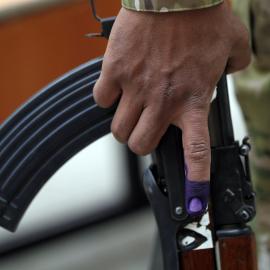To the Editor:
Daniel Byman raises some valid concerns over the U.N. weapons inspection program in Iraq ("A Farewell to Arms Inspections," January/February 2000). Now that the U.N. Security Council has passed a new resolution (albeit with four abstentions), inspectors may return to Iraq. Whether Byman's concerns prove accurate will depend largely on the conditions agreed on in exchange for Iraqi cooperation. But Byman does not address some fundamental dynamics that bear directly on the future of inspection work in Iraq.
First, the overall debate on Iraq, including within the Security Council, concerns much more than nonproliferation. The priority attached to nonproliferation appears to have diminished greatly since 1991, when the original cease-fire resolution required the disarmament of weapons of mass destruction (WMD). Ironically, the success of the U.N. Special Commission (UNSCOM) in accounting for a large portion of Iraqi weapons has diminished some people's concern over what weapons remain. Other issues are more prominent, such as the legitimacy and effectiveness of sanctions, the fate of the general Iraqi population, oil prices, the efficacy of the Security Council, domestic politics, and U.S. dominance in the Security Council.
Second, the disarmament obligations of the Security Council resolutions that created UNSCOM -- and now the U.N. Monitoring, Verification, and Inspection Commission (UNMOVIC) -- bear resemblance to the disarmament portion of the 1919 Versailles Treaty ending World War I. There is a striking similarity between the creation, implementation, and ultimate demise of the two respective organs charged with monitoring and disarmament -- the Inter-Allied Control Commissions for the Versailles Treaty and UNSCOM for the Gulf War cease-fire Resolution 687.
A third factor is the diminished strength of both the carrots and the sticks intended to shape Iraqi behavior. The threat of major military action is no longer plausible, given current Security Council politics. By the same token, the prospect of Iraq's gaining unfettered use of its oil revenues is also not probable. Yet WMD capability is extremely important to Iraq. Chemical munitions played a major role in countering the Iranian "human wave" attacks toward the end of the Iran-Iraq War, and Iraq could well believe that its chemical and biological weapons capabilities may have deterred the coalition from going all the way to Baghdad in 1991.
Fourth, the objectives of Security Council members have been diverging since 1991. In August 1990, there was a strong consensus to impose sanctions and the embargo linked to Iraq's withdrawal from Kuwait. There was still a consensus after the war to link the embargo to WMD disarmament and monitoring. But over time, the objectives of individual council members have evolved while those of Iraq have remained largely unchanged. The long negotiation to achieve a new Security Council resolution on Iraq reflects this evolution -- and the final version straddles many divergent trends and defers some key issues, such as the matter of continuing controls over Iraqi oil revenues at a time when sanctions may be suspended.
It is likely that UNMOVIC will be able to do no more than the Security Council will support and Iraq will permit. In the year since UNSCOM left Iraq, the Security Council has not changed Iraq's behavior, but it has changed the organization charged with monitoring and disarmament.
Charles Duelfer
Former Deputy Chair, UNSCOM
